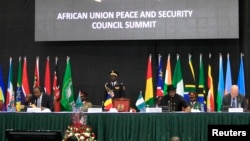A majority of Africans said they favor presidential term limits, according to a report by Afrobarometer, a non-partisan pan-African research organization.
In a new survey of 51,600 citizens in 34 African countries, Afrobarometer found three-fourths of the citizens favor limiting a presidential candidate to a maximum of two terms.
Boniface Dulani, program manager for Southern Africa, and author of the report, said the survey shows more educated Africans and those with high level of exposure to the news media tend to favor presidential term limits.
“We do have, for example, countries like Benin where 90 percent of Beninese say their president should be limited to two-term limit, countries like Togo where 83 percent say their president should be limited to two terms, and three-quarters of Cameroonians say their president should be limited to two terms,” he said.
Other countries like Tanzania, Cote d’Ivoire, Zambia, Uganda, Mali, Egypt, Guinea, and Liberia scored in the mid-80s percentile in favor of such limits. Only 44 percent Algerians favor term limits, according to the survey.
“Countries like Zimbabwe, where President Robert Mugabe has been in office for more than 30 years, 74 percent say that their president should be limited. Burundi, which has been in the news, in 2013, 51 percent of Burundian citizens, said their president should be limited. But, this number has actually increased to 62 percent,” Dulani said.
President Pierre Nkurunziza, who has faced violent protests for his decision to seek a third term, had argued that the demonstrations against him had been mostly limited to the urban areas and that a majority of rural Burundians support him.
“By and large, the term limits are supported across the board, people in urban areas, as well as those in rural areas, the educated, as well as the less educated, even though there are slight differences. So, I don’t think the argument by [the] likes of Pierre Nkurunziza in Burundi to suggest that those who are opposed to a third term bid for him are only those in urban areas,” Dulani said.
Dulani said the demand for term limits gained popularity during Africa’s democratic transition in the 1990s when many African countries were emerging from under leaders who manipulated the political space to remain in power, like Ivory Coast’s Felix Houphouet-Boigny and Hastings Kamuzu Banda of Malawi.
“So, term limits were embraced at that point as a way of getting rid of that tradition of ‘big man’ rule on the continent. Overall, African citizens themselves embraced this as part of the democratic transition,” Dulani said.
He said Afrobarometer conducts its surveys face-to-face and translates all of its questionnaires in the language of the respondents.
“In the last round of [the] survey, we’ve spoken to citizens in 35 countries on the continent, and those countries represent nearly three-quarters of the population on the continent. So, we are very confident our surveys are fully representative of the views of the ordinary African citizen,” Dulani said.





